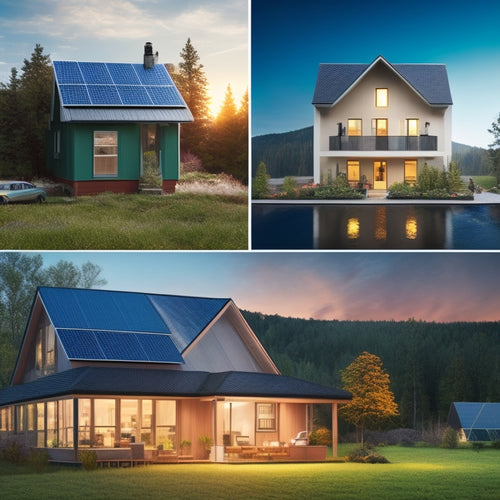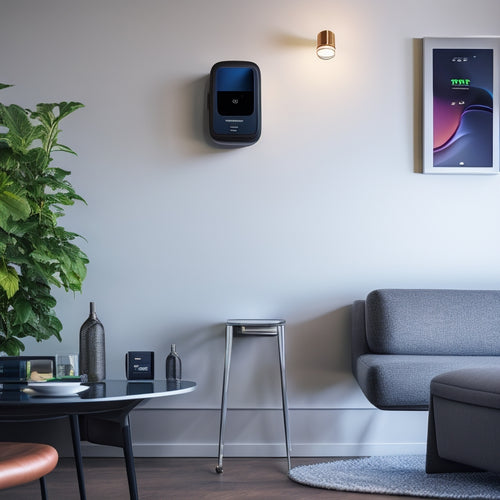
Powering Business Growth With Renewable Energy Solutions
Share
By incorporating renewable energy solutions into your business strategy, you can reduce your reliance on the grid, stabilize energy costs, and enhance your organization's reputation. Investing in on-site renewable energy systems, energy-efficient technologies, and sustainable practices can lead to significant cost savings, increased energy independence, and a competitive edge. As you explore the benefits of renewable energy, you'll discover opportunities to minimize waste, optimize supply chains, and future-proof your business against rising energy costs and uncertain energy markets. As you move forward, you'll uncover even more innovative ways to power business growth while reducing your carbon footprint.
Key Takeaways
• Investing in on-site renewable energy systems reduces reliance on the grid, ensuring a stable and predictable energy future for businesses.
• Implementing energy-efficient technologies and practices helps businesses reduce their carbon footprint and minimize waste.
• Solar panel installation decreases energy bills, increases property value, and provides government incentives like tax credits and grants.
• Energy storage and backup systems, such as lithium-ion batteries, ensure a steady power supply and mitigate the impact of grid outages.
• Commercial vehicle charging solutions and fleet management optimize energy efficiency, reduce costs, and enhance brand reputation.
Boosting Energy Independence
By investing in on-site renewable energy systems, you can greatly reduce your reliance on the grid and boost energy independence. This approach enables you to take control of your energy needs, ensuring a more stable and predictable energy future.
Energy autonomy is within your grasp, allowing you to make strategic decisions that benefit your business. By implementing self-sufficiency strategies, you can reduce your exposure to fluctuating energy prices and grid outages.
On-site renewable energy systems, such as solar or wind power, can provide a reliable source of energy, giving you greater control over your operations. By harnessing local renewable energy, you can increase your energy independence, reduce your reliance on the grid, and take a significant step towards energy autonomy.
Reducing Carbon Footprint Effectively
To reduce your carbon footprint effectively, you must identify and prioritize areas of your operations where energy efficiency improvements can have the greatest impact. Conducting a thorough energy audit will help you pinpoint opportunities to optimize energy usage and minimize waste.
Next, implement supply chain optimization strategies to reduce transportation-related emissions and streamline your logistics. Additionally, consider carbon offsetting initiatives to compensate for unavoidable emissions.
Solar Panel Installation Benefits
Installing solar panels on your commercial property can greatly decrease your reliance on the grid and lower your energy bills. By harnessing the power of the sun, you'll reduce your energy consumption from the grid, resulting in significant cost savings. Additionally, solar panels increase the value of your property, making it more attractive to potential buyers.
| Benefits | Description | Impact |
|---|---|---|
| Cost Savings | Reduced energy bills | Increased profitability |
| Increased Efficiency | Reduced energy consumption | Improved bottom line |
| Environmental Benefits | Reduced carbon footprint | Enhanced brand reputation |
| Property Value | Increased property value | Enhanced asset value |
| Government Incentives | Tax credits and grants | Increased ROI |
Energy Storage and Backup
As you consider renewable energy solutions for your business, you'll need to think about how to secure a steady power supply when the sun isn't shining or the grid is down.
That's where energy storage and backup systems come in, providing a reliable safeguard against outages and disruptions.
Backup Power Systems
How do you guarantee your business remains operational during extended power outages, natural disasters, or grid failures, and what role do backup power systems play in mitigating these risks?
As a business owner, you understand the importance of system reliability. A backup power system guarantees your operations continue uninterrupted, even during power outages. With a reliable backup system, you can minimize downtime, reduce revenue loss, and maintain customer satisfaction.
Energy Storage Options
You can rely on energy storage options to provide a reliable backup power supply, bridging the gap between grid outages and generator startup, and guaranteeing your business remains operational during extended power disruptions. These options are essential for maintaining business continuity and minimizing revenue loss.
| Energy Storage Option | Description |
|---|---|
| Lithium-Ion Batteries | High energy densification, low maintenance, and long lifespan |
| Lead-Acid Batteries | Cost-effective, well-established technology, and easy maintenance |
| Flow Batteries | Scalable, flexible, and suitable for long-duration energy storage |
| Flywheel Energy Storage | High-power, short-duration storage, and low maintenance |
Proper battery maintenance is essential to maintain the reliability and efficiency of your energy storage system. Regular checks and maintenance can help prevent battery degradation and extend their lifespan. By selecting the right energy storage option for your business, you can ensure a seamless continuation during power outages and minimize downtime.
Grid Resiliency Solutions
In addition, by integrating energy storage and backup systems, businesses can greatly enhance grid resiliency, ensuring continuous operation even during prolonged grid outages. You'll be able to maintain critical operations and protect your business from revenue losses.
A resilient grid also allows you to better manage energy distribution, reducing the risk of brownouts and blackouts. Additionally, advanced grid management systems enable you to detect and respond to cybersecurity threats in real-time, safeguarding your energy infrastructure from potential attacks.
With a robust energy storage and backup system, you'll have complete control over your energy supply, ensuring your business remains operational and competitive.
Commercial Vehicle Charging Solutions
As businesses increasingly adopt electric fleets, installing commercial vehicle charging solutions becomes essential for ensuring uninterrupted operations and minimizing downtime.
You need to take into account several key factors when designing and implementing a commercial vehicle charging solution. Effective fleet management is vital, requiring a thorough understanding of your vehicle usage patterns, charging schedules, and energy consumption.
The charging infrastructure must be scalable, reliable, and compatible with various vehicle types. Additionally, vehicle compatibility is essential, ensuring that your charging solution accommodates diverse makes and models.
Moreover, you'll need to take into consideration charging speeds, balancing fast charging capabilities with energy efficiency and cost savings.
Green Initiatives for Business
As you explore green initiatives for your business, you're likely considering ways to reduce your organization's environmental impact while promoting sustainable growth.
You'll want to focus on embracing eco-friendly practices that benefit both your bottom line and the planet.
Embracing Eco-Friendly Practices
Incorporating eco-friendly practices into your business strategy can greatly reduce your organization's environmental footprint, ultimately contributing to a more sustainable future. By embracing eco-friendly practices, you'll not only appeal to the growing demographic of eco-conscious consumers but also enhance your brand reputation through effective green marketing. This can lead to increased customer loyalty, improved brand differentiation, and even cost savings.
Reducing Carbon Footprint
You can greatly decrease your business's carbon footprint by implementing green initiatives that target energy efficiency, sustainable supply chains, and waste reduction. By adopting environmentally friendly practices, you can reduce your company's impact on the environment.
One effective strategy is carbon offsetting, which involves investing in projects that reduce greenhouse gas emissions, such as reforestation or renewable energy projects. Additionally, optimizing your supply chain can markedly reduce your carbon footprint. This can be achieved by sourcing materials locally, reducing transportation emissions, and promoting sustainable practices throughout your supply chain.
Sustainable Operations
Implementing sustainable operations requires integrating eco-friendly practices into your business's daily activities. This includes utilizing energy-efficient lighting and HVAC systems, sustainable water management, and strategies to minimize waste generation. These practices not only reduce your environmental impact but also lead to cost savings and improved brand reputation.
To achieve sustainable operations, consider the following strategies:
-
Optimize your supply chain: Work with suppliers who adhere to sustainable practices, reducing the carbon footprint of your entire value chain.
-
Implement waste reduction strategies: Identify areas where waste can be minimized, and implement recycling programs to reduce landfill waste.
-
Invest in energy-efficient technologies: Upgrade to energy-efficient equipment and lighting to reduce energy consumption and lower your energy bills.
Frequently Asked Questions
Can Renewable Energy Solutions Be Integrated With Existing Infrastructure?
You can integrate renewable energy solutions with existing infrastructure by identifying areas for infrastructure upgrades and ensuring system compatibility, which allows you to harness renewable energy efficiently and cost-effectively.
How Do Renewable Energy Solutions Impact Business Operations During Power Outages?
'Just like the phoenix rising from the ashes, you can guarantee business continuity during power outages with renewable energy solutions, leveraging backup systems and energy resilience to minimize downtime and maintain operational control.'
Are Renewable Energy Solutions More Expensive Than Traditional Energy Sources?
When evaluating cost, you'll find that renewable energy solutions can be more expensive upfront, but their long-term economic viability makes them a competitive option, as operational costs are considerably lower than traditional energy sources.
Can Renewable Energy Solutions Be Customized for Specific Business Needs?
You can tailor renewable energy solutions to your business needs through energy audits, which inform a customized business strategy, ensuring a seamless integration that aligns with your operations and goals, maximizing efficiency and cost savings.
Do Renewable Energy Solutions Require Specialized Maintenance Teams?
As you navigate the renewable energy landscape, you'll find that specialized maintenance teams aren't always necessary, but having trained professionals familiar with specific training protocols and adhering to strict safety regulations is essential for peak performance.
Related Posts
-

What Does Your Home Energy Audit Report Reveal?
Your home energy audit report reveals a detailed analysis of your energy consumption patterns, highlighting areas of ...
-

7 Best EV Battery Health Trackers for Homeowners
You can maximize your electric vehicle's performance and lifespan by leveraging advanced battery health trackers that...
-

7 Smart Air Purification Hacks for Energy-Savvy Homes
You can notably improve your indoor air quality while minimizing energy consumption by implementing strategic air pur...


